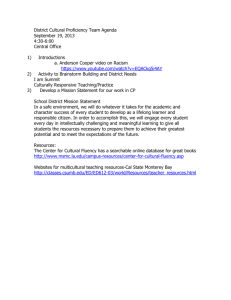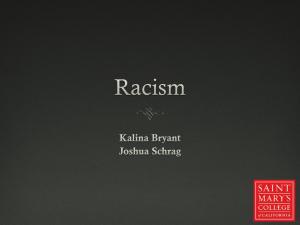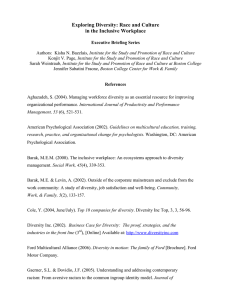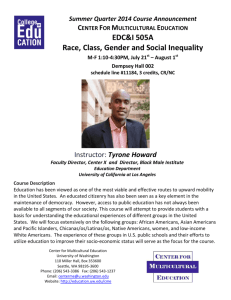INDIVIDUAL PRESENTATIONS 9:30am-11:00am Concurrent Session I
advertisement
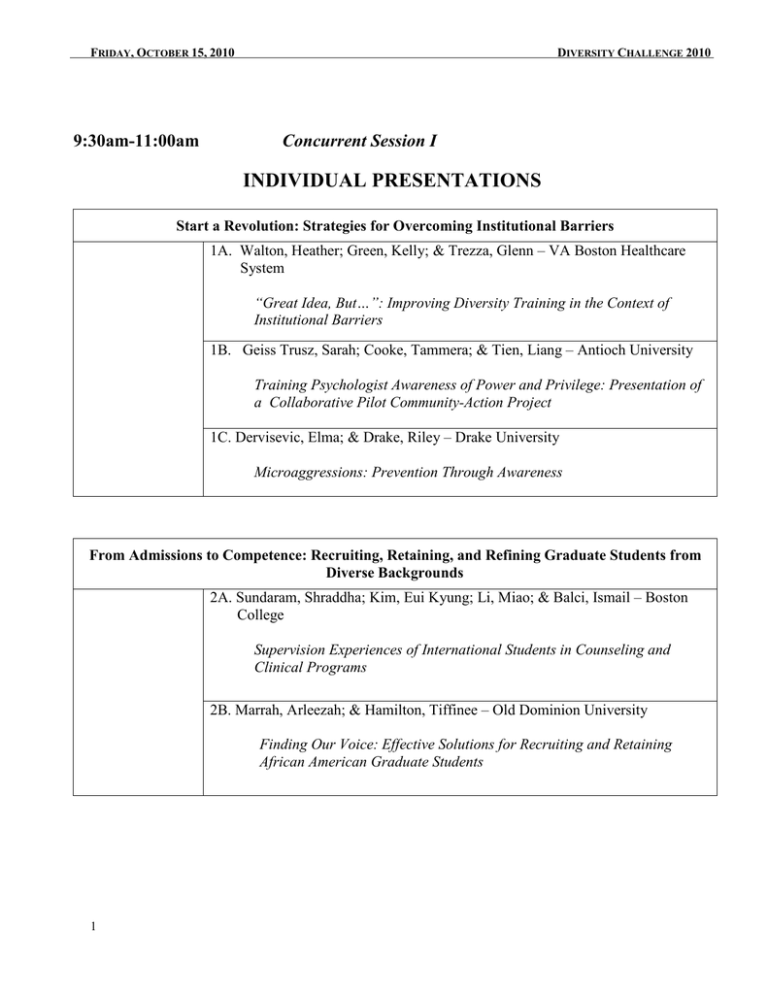
FRIDAY, OCTOBER 15, 2010 9:30am-11:00am DIVERSITY CHALLENGE 2010 Concurrent Session I INDIVIDUAL PRESENTATIONS Start a Revolution: Strategies for Overcoming Institutional Barriers 1A. Walton, Heather; Green, Kelly; & Trezza, Glenn – VA Boston Healthcare System “Great Idea, But…”: Improving Diversity Training in the Context of Institutional Barriers 1B. Geiss Trusz, Sarah; Cooke, Tammera; & Tien, Liang – Antioch University Training Psychologist Awareness of Power and Privilege: Presentation of a Collaborative Pilot Community-Action Project 1C. Dervisevic, Elma; & Drake, Riley – Drake University Microaggressions: Prevention Through Awareness From Admissions to Competence: Recruiting, Retaining, and Refining Graduate Students from Diverse Backgrounds 2A. Sundaram, Shraddha; Kim, Eui Kyung; Li, Miao; & Balci, Ismail – Boston College Supervision Experiences of International Students in Counseling and Clinical Programs 2B. Marrah, Arleezah; & Hamilton, Tiffinee – Old Dominion University Finding Our Voice: Effective Solutions for Recruiting and Retaining African American Graduate Students 1 FRIDAY, OCTOBER 15, 2010 DIVERSITY CHALLENGE 2010 Intervening with Invisible Populations Who are Visible Minorities 3A. Capodilupo, Christina; & Smith, Kristin – University of Hartford The Effects of Idealized Media Images on African American Women’s Body Image 3B. Castel, Philippe; & Lacassagne, Marie-Francoise – UB-UC Burgandy University, SPMS Laboratory Employment Coaching: How to Manage Personal Social Identity of “Stigmatised” Unemployed People 3C. Borodovsky, Lisa – Pace University and Marymount Manhattan College Challenges in Teaching Undergraduate Psychology Classes to Incarcerated Women STRUCTURED DISCUSSIONS Resistance! Creating Spaces and Fostering Self-exploration 1. Taylor, Sylvie; & Marrero, Lucy – Antioch University Diversifying Diversity Instruction: Toward Inclusive Diversity Education in Psychology Programs 2. Yokoyama, Kayoko; Magraw, Sukie; Alie, Laura; Hernes, Reeta; Herrera, Cinthya Chin; & Hubbard, Catherine – John F. Kennedy University Classroom Ruptures: Unpacking and Responding to Microaggressions in Multicultural Training 2 DIVERSITY CHALLENGE 2010 FRIDAY, OCTOBER 15, 2010 Can You Teach Cultural Competence? Models for Learning 1. Delano-Oriaran, Bola – St. Norbert College Preparing White Pre-Service Teachers: Using Culturally Appropriate Service Learning Methods 2. Thompson, Becky; & Rizzo, Crystal – Simmons College Using Contemplative Practices / Indigenous Methods in Teaching About Justice Looking into the Clinician’s Mirror: Self-awareness for Trainees and Supervisors 1. Smith, Christopher – University of Missouri; & Pride, Michelle - Ohio University Who Watches the Watchers: Reciprocal Awareness of Cultural Competence in Supervision 2. Heselmeyer, Rebecca – James Madison University; Czyszczon, Greg– Cross Roads Counseling Center, Harrisonburg, VA Encouraging Worldview Development: A Framework for Moving Toward Ethnorelativism SYMPOSIUM A Grassroots Approach to Changing Culture and Climate in the Classroom Chair: Evett, Sophia – Salem State University Presenters: Hakstian, Anne-Marie; & Benton, Robin – Salem State University An interdisciplinary team of faculty and administrators provides a framework for developing programs that assist faculty in integrating race, culture, diversity, and social justice in courses across the curriculum. In this interactive session, participants will receive materials and examples of curriculum transformation and discuss implementation, outcomes, and assessment. 3 FRIDAY, OCTOBER 15, 2010 DIVERSITY CHALLENGE 2010 WORKSHOPS Wijeyesinghe, Charmaine Lietzau; & Goodman, Diane – Consultants Using an Intersectional Paradigm in Teaching, Research, and Practice* This session discusses the paradigm of intersectionality-how different social identities, such as race, gender, and sexual orientation, influence each other. We explore strategies for integrating this perspective into teaching, research, and counseling on race and racial identity. Strengths, challenges, and questions in utilizing an intersectional perspective are discussed. *CEs offered (1.5) McQuillan, Patrick; & Muellner, Leo – Boston College A Critical Exploration of Cross-Cultural Miscommunication The workshop will create a scenario in which two different cultural groups interact. After completing the role play, participants will address the following: (1) Describe each group, from the perspective of a group member and the perspective of someone from the other group. How do their views of the “other” differ from their descriptions of themselves. (2) What characteristics did your observations focus upon? What did you not mention? What impact might that have had on your interactions? (3) How would you characterize the nature of your interactions? How did you feel after the role play ended? (4) Based on these responses, what might be some implications for promoting positive interactions among differing cultural groups? 11:00am-11:10am BREAK 11:10am-11:15am Welcoming Remarks 4 DIVERSITY CHALLENGE 2010 FRIDAY, OCTOBER 15, 2010 INVITED PANEL 11:15am-12:45pm YAWKEY CENTER MURRAY ROOM Usha Tummala-Narra, Ph.D. – Boston College LaQueta Wright, Ph.D. – Dallas County Community College District at Richland College From the Therapy Room to the Campus Cultural Center: Race Matters* * CEs offered (1.5) 5 FRIDAY, OCTOBER 15, 2010 DIVERSITY CHALLENGE 2010 POSTER SESSION I LUNCHEON 12:45pm-1:45pm MURRAY ROOM, YAWKEY CENTER Alston, Winsome A. – College of Staten Island (CUNY) The Ramifications of a Classroom Climate that Operates on Impersonality, Condescension, and Arrogance Bell, Tyronn – University of Indianapolis Improving Minority Experience Exercises for Clinical Psychology Graduate Students Capodilupo, Christina; & Smith, Kristen – University of Hartford Associations Between Racism, Body Image, and Eating Habits among African American Women Henderson, Daphne – University of Tennessee at Martin Mainstreaming: Effective Coping Strategies for Faculty of Color at Predominantly White Institutions Koo, Chungseung – The University of Texas at Austin; & Kwon, Kyung Hyun – John Hopkins University Motivational Preventive Counseling on Internet Addiction among Korean Adolescents Scott, Jimmy – The School of Professional Psychology at Forest Institute Contemporary Forms of Racism among Euro-Americans Tang, Jennifer – Northeastern University Cultural Considerations in Examining Personality Assessments Used on Asian Populations Walsh-Blair, Lynn – Boston College Supervisor Experiences with Urban Youths Through a Work-Based Learning Program Wise, Christina L. – The University of Georgia Does School Attitude Impact Achievement for African American and Latino/a Juvenile Offenders? Wolfe, Connie; Rabinovich, Abbey; & Freckleton, Sherika – Muhlenberg College Student and Faculty “Happy Talk” about Diversity: An Obstacle to Teaching about Racism Wong, Herbert; & Escobar, Julia – John F. Kennedy University Outcomes for the Against Violence Parents Training Programs in the Latino Community 6 DIVERSITY CHALLENGE 2010 2:00pm-3:30pm FRIDAY, OCTOBER 15, 2010 Concurrent Session II INDIVIDUAL PRESENTATIONS Standing Tall: Fighting Race-related Resistance in Classrooms and Beyond 1A. James, Michelle – Oakton Community College Pitfalls, Triumphs & Challenges: The Predicament of Teaching Race and Culture in Higher Education 1B. Borum, Valerie – University of Illinois at Chicago Teaching Concepts of Race and Ethnicity: An Afro-Feminist Cultural Perspective 1C. Solomon, Sondra – University of Vermont Difficult Dialogues: UVM’s Fall Institute on Racism, Heterosexism, Bias and Oppression 1998-2010 Cultural Incongruence on Campuses and in Classrooms 2A. Hall-Campbell, Niambi – North Carolina State University School Climate and Culturally Relevant Pedagogy Beliefs in Bahamian Secondary Education 2B. LeChasseur, Kimberly – Greater Philadelphia Urban Affairs Coalition The Effects of Segregating Through School Choice: Examining Schooling and Success Patterns 2C. Reese, Bernard – Worcester Public Schools Hope for Oppressed Children: Equity and Social Justice in the Classroom 7 FRIDAY, OCTOBER 15, 2010 DIVERSITY CHALLENGE 2010 STRUCTURED DISCUSSIONS Pedagogy in Practice: Learning in Multicultural Environments 1. Moore, Nataka – Adler School of Professional Psychology Community Assets/Needs Culturalgram: Training Community-Focused Graduate Students to Assess the Assets, Needs, and Cultural Aspects of Communities Preparing Responsive Teachers: Students’ Voices, Students’ Needs 2. Rhone, Malinda – Phoenix Cultural Resources, Bowie, MD; & Cherry, Arvenita Washington Youth Discourse on Race and Disparity Liberating Psychologists: Experiences as Social Justice Agents 1. Gallor, Susanna; & Clouse, Stephanie – University of New Hampshire From Multicultural Competencies to Advocacy Competencies: Becoming Agents of Social Justice 2. Moritz, Ann – Lesley University and Moritz Advisory Group, Boston, MA Engaging a Sociocultural Perspective Policy: Integrating Language, Behavior, and Self The Complexity of Intersectionality: Understanding the Paradigm and Putting it into Practice 1. Lawson, Jasper – Private Practice Doing Psychotherapy with Gay Men of African Descent 8 DIVERSITY CHALLENGE 2010 FRIDAY, OCTOBER 15, 2010 Oral History of Prominent Psychologists of Color: Portraits of Resilience and Contribution 1. Henderson, Sheila; Oh, Christine –Alliant International University; & Pickren, Wade – Ryerson University Oral History of Prominent Psychologists of Color: Portraits of Resilience and Contribution Faith and Race: Experiences in Psychotherapy and Training 1. Freidin, Elizabeth – City College of New York Working the Intersection of Race, Gender, Religion and Sexual Orientation: A Clinical Study 2. Drennan, Amy; & Yoon Hammer, Miyoung – Fuller Theological Seminary Expanding the Lens Through Integration SYMPOSIA Bridging Multiple Divides: Tackling Diversity in a College-Based Mentoring Program Chair: Lee Williams, Joanna – University of Virginia Presenters: Leyton, Jen; Germain, Lauren; & Wiggins, Afi – University of Virginia Discussant: Deutsch, Nancy – University of Virginia The papers in this symposium focus on aspects of curriculum, training, and outcomes related to diversity within a college-based mentoring program for middle-school girls. Using qualitative and/or quantitative data, each paper presents research on an aspect of cultural competence as it relates to mentoring programs and service learning. 9 FRIDAY, OCTOBER 15, 2010 DIVERSITY CHALLENGE 2010 Alternative Models of Identity: Filling in the Gaps for Research and Training Chair: Banks, Kira Hudson – Illinois Wesleyan University Presenters: Smith, Lauren; Becker, Rachel; & Birichi, Daniel – University of Miami Discussant: Banks, Kira Hudson – Illinois Wesleyan University This symposium panel highlights the complex nature of multidimensional identity processes through a review of alternative models of identity. Presenters will examine multiracial identity, the intersection of international and sexual minority identities, and impact of ethnic identity and acculturation on perceptions of mental health and illness among immigrant populations. WORKSHOPS Ewing, Kimberly; & Rivera, Bridget – Loyola University of Maryland The Identity Exploration Seminar – An Intensive Training in Counselor Self Awareness This workshop will provide attendees with an experiential example of an identity exploration seminar. Participants will be provided with opportunities to experience the seminar, while also witnessing facilitation techniques. Literaturebased evidence for focusing on self-awareness will be discussed. Attendees will learn how to facilitate identity exploration seminars for their own trainees. Thompson, Monita; & Dessel, Adrienne – University of Michigan Facilitating Intergroup Dialogues on Race* The Program on Intergroup Relations at the University of Michigan provides training for facilitators of intergroup dialogue; a sustained, structured method of learning about social identity, intergroup relations, and social justice. Presenters introduce this pedagogy and provide participants with an opportunity to experience facilitation through interaction and engagement. * CEs offered (1.5) 10 DIVERSITY CHALLENGE 2010 FRIDAY, OCTOBER 15, 2010 Goodman, Diane J. - Consultant Understanding and Addressing White Students’ Resistance to Exploring Racism One of the most challenging aspects of educating about racism is the resistance from White people. Developing a deeper understanding of why people may be defensive allows for both greater compassion and the development of strategies to overcome the resistance. Resistance is an expression of fear and discomfort with psychological and sociopolitical roots. Psychological factors include the protection of self-worth, cognitive dissonance, fears about change, and focus on their own pain. Sociopolitical factors include societal structures, values, and norms that promote the belief in meritocracy, competitive individualism, blaming the victim, and White supremacy. Strategies for preventing and reducing resistance are suggested within three main approaches: building relationships and safety; affirming, validating, and conveying respect for students; and utilizing the students’ frame of reference. 3:30pm-3:45pm BREAK INVITED PANEL Nancy Boyd-Franklin, Ph.D. – Rutgers University Y. Barry Chung, Ph.D. – Northeastern University 3:45pm-5:30pm YAWKEY CENTER MURRAY ROOM No More Secrets: Racial-cultural Training that Meets the Needs of Sexual Minorities and Adolescents* * CEs offered (1.5) 11 DIVERSITY CHALLENGE 2010 9:30am-11:00am SATURDAY, OCTOBER 16, 2010 Concurrent Session III INDIVIDUAL PRESENTATIONS Silent No More: Giving Voice to Immigrant Youths, Multiracial Young Adults, and Transracial Adoptees 1A. Bert, Shannon; & Nix, Katelynn – University of Oklahoma Causes and Consequences: Examining Racial Identity Among Biracial/Multiracial College Students 1B. Tang, Jennifer; & Roehrig, James – Northeastern University Children of Color Whose Mothers Are White: Implications for Community Interventions 1C. Bekteshi, Venera; Xu, Qingwen; & Tran, Thanh – Boston College School of Social Work Family, School, Country of Birth, and Adolescents’ Psychological Wellbeing Stigmatized Teachers and Students: Surviving When You’re the Minority 2A. Montano, Esta – Massachusetts Department of Elementary and Secondary Education “I Think They Feel Like Visitors:” White Educators’ Perspectives of METCO Students 2B. Rangel-Mayberry, Azucena – Texas State University Teacher Expectations: The Influence of Teacher Variables 12 DIVERSITY CHALLENGE 2010 SATURDAY, OCTOBER 16, 2010 Stop Doing That! CreatingWellness Interventions in Communities of Color 3A. Martin, Lorena – University of Miami Project STUD (Sexual Teachings & Understanding Drugs Aimed at Hispanic Children) 3B. Niemeier, Janet – Virginia Commonwealth University; & Lewis, Allen – VCU Department of Rehabilitation Counseling The Cultural Competence in Rehabilitation Science Institute 3C. Menzise, Jeffrey – Morgan State University Culturally-Grounded Health Messages to Decrease Risky Behaviors The Assimilation/Acculturation Blues: Learning How to Cope in a Multiracial World 4A. Nadal, Kevin; Wideman, Michelle; Wong, Yinglee; & Griffin, Katie – John Jay College of Criminal Justice Mental Health Implications of Multiracial Microaggressions 4B. Fukuda, Derrin; & Takayama, Jarrett – Pacific University School of Professional Psychology Becoming “Coconuts” and “Twinkies:” Assimilation to the Dominant Culture Through a Hawaii Lens 4C. DiFrancesco, Claire – Lesley University The Experiences of Students of Southeast Asian Descent in a College of Pharmacy 13 SATURDAY, OCTOBER 16, 2010 DIVERSITY CHALLENGE 2010 STRUCTURED DISCUSSIONS Faculty Survival Guide: Graduate Instructors and Faculty Focusing on Diversity 1. DelTosta, Jill; Bernardi, Shaina; Carnicella, Robert; & Khan, Duane – University at Albany On Teaching Multiculturally-Inclusive Career Development 2. Delano-Oriaran, Bola; & Meidl, Tynisha – St. Norbert College Indicators of Success: Faculty of Color at Predominantly White Institutions Talking About Whiteness: Race and Ethnicity Among White People 1. Dorazio, Cristina; Kuroda, Rie; & Stafford, Jennifer – Teachers College, Columbia University Examining the Cultural Experiences of Italian-Americans: Implications for Training and Practice 2. Tarasawa, Beth – St. Norbert College; & Gonzalez, Belisa – Ithica College Racing the Classroom: Unpacking Color-blind Racism in Predominantly White Institutions Educational Policy and Practice: Giving Voice to Race in Classrooms 1.Cherry, Arvenita Washington – Phoenix Cultural Resources, Bowie, MD Reading, Writing, and Racialization: Constructing Blackness and Latinoness in Middle School 2. Gross, Patricia – University of Scranton Cross-Cultural Dynamics: Searching for Literacy Authenticity 14 DIVERSITY CHALLENGE 2010 SATURDAY, OCTOBER 16, 2010 SYMPOSIA Why Is There a Shortage of Women and Minority Faculty? Chair: Mosley, Pauline – Pace University Presenters: Morgan, Erica – University of Michigan; Hargrove, Keith; Rogers, Tamara – Tennessee State University The panelists answer the question, “Why is there a shortage of women and minorities in the academy?” Panelists will share their strategies for advancing within the academy and how they resolved various roadblocks. Time management, career planning, faculty mentorship, and college-wide initiatives with respect to faculty diversity will be discussed. The Journeys of Aspiring Teachers in Learning the Importance of Race and Culture in Teaching and Supervision Chair: Phelps, Rosemary – University of Georgia Presenters: Pittman, Delishia; Wise, Christina; & Howell, Tiffany Atkins – University of Georgia Discussant: Warner, Cheryl – Clemson University How aspiring teachers understand and deal with their own race and culture as teachers and supervisors, how they incorporate diversity coursework, and how they facilitate student learning of diversity coursework are the topics of this symposium. Three aspiring teachers will share their journeys in this regard. 15 SATURDAY, OCTOBER 16, 2010 DIVERSITY CHALLENGE 2010 WORKSHOPS Mock, Matthew – John F. Kennedy University; Arora, Kiran Shahreen Kaur – University of Massachusetts; & Chu, Melissa – Simmons College Teaching about Culture in Psychology – Diversities and Complexities: Asian American and Pacific Islanders as a Case Example The teaching, supervision, and training of all mental health practitioners in culturally competent care remains a commitment. While there is to be inclusion of culture, there are potential challenges. This dynamic, engaging workshop discusses successes utilizing the Asian American Pacific Islander (AAPI) communities as a core example. Westphal, Maren – Columbia University Learning Spanish as a Foreign Language for Mental Health Professionals Given the dearth of Hispanic/Latino mental health professionals, it is incumbent on US clinicians serving bilingual Spanish-dominant patients to learn Spanish to provide better care to underserved populations. This workshop will provide clinicians and supervisors/teachers of students motivated to learn Spanish with knowledge and tools to facilitate the learning process. Wong, Herbert; & Escobar, Julio – John F. Kennedy University Training Promotores in the Evidence-Informed Parents Raising Safe Kids Program The ACT Parents Raising Safe Kids Program at John F. Kennedy University partnered with La Clinica de La Raza to train Promotores in safe parenting and violence prevention. The curriculum and lessons learned will be highlighted for the APA's evidence-based Training-the-Trainers program to Promotores for work in the Latino communities. 16 DIVERSITY CHALLENGE 2010 SATURDAY, OCTOBER 16, 2010 Venner, Kamilla; & Verney, Steven – University of New Mexico Motivational Interviewing to Facilitate Student Clinician’s Change in Multicultural Courses* Multicultural courses for student clinicians can be the most challenging of graduate courses to teach in a training program as they balance intellectual issues with emotional processing. Students often begin this course with significant apprehension and resistance to multicultural training and may minimize course material and instructor expertise. Handling difficult class multicultural dialogues and student resistance requires advanced teaching and clinical skills. In this dynamic workshop, participants will learn how a motivational interviewing (MI) style can facilitate self-exploration and change in graduate clinical students. MI seems to work best for those who are resistant to change. Given multicultural topics can raise resistance in students, MI seems a good fit as students broaden worldviews and attitudes necessary in achieving cultural competence. * CEs offered (1.5) 11:00am-11:10am BREAK 11:10am-11:15am Remarks INVITED PANEL 11:15am-12:45pm YAWKEY CENTER MURRAY ROOM Paula S. Martin, Ph.D. – Needham Public Schools Lisa Patel Stevens, Ph.D. – Boston College Jean Wu, Ph.D. – Tufts University No Child (or Teacher) Left Behind: UndoingRacism and Xenophobia in Education* * CEs offered (1.5) 17 SATURDAY, OCTOBER 16, 2010 DIVERSITY CHALLENGE 2010 POSTER SESSION II LUNCHEON 12:45pm-1:45pm YAWKEY CENTER MURRAY ROOM Bekteshi, Venera; Xu, Qingwen; & Tran, Thanh– Boston College School of Social Work Ethnicity, Country of Birth, and Perceptions of Wellbeing Among Low-Income Mexican Women Butay, Elinor; & Wong, Chelsea – Pacific University When Aloha Wears Thin: Addressing Ambassador Fatigue and Colorblindness as Microaggressions Caplen, Daniel – Lewis & Clark College Campus Climate Experiences Among Caucasian and American and International Ethnic Minority Students Chen, Szuyeh – Columbia University Cultural Factors of Asian-American Client Self-disclosure in Psychotherapy Dassani, Amee - Kaplan Online University; & Moore, Nataka – Adler School of Professional Psychology South Asian-American Racial Socialization Model: A Model for Supervisors and Educators that Defines the Complexities of the South Asian-American Experience Estudillo, Antonio – Indiana University, Bloomington Critically Evaluating the State of Research on Family Intervention for Latina/o Adolescents Eugenio, Jasmine – Pacific University “I’m Dating a Haole Who Bowls: Interethnic Dating from a Hawaiian Perspective” Griffin, Kate; Nadal, Kevin; Wideman, Michelle; & Wong, Yinglee – John Jay College of Criminal Justice 1. Using Quantitative Measures to Examine Microaggressions and 2. Processes of Religious Microaggressions: Experiences from Minority Group Perspectives Jones, Elaine – Arcadia University Supporting Education in Gambia, Africa: Service Project in an undergraduate Seminar Course McFarlane, Tracy – Columbia University and The University of the West Indies (Mona) Racial and Ethnic Identification among Caribbean University Students Tawa, John; Suyemoto, Karen; & Ng, Fanny – UMASS-Boston The Effects of Racial Identity Statuses on Asian American Students’ Positive Gains in Asian American Studies Classes Williams, Jessica; Walker, Kari; Aynaz, Sabahat Ezgi; & Carrasco, Gabriela – University of North Alabama The Need for and the Development of an Acculturation Styles Measure 18 DIVERSITY CHALLENGE 2010 2:00pm-3:30pm SATURDAY, OCTOBER 16, 2010 Concurrent Session IV INDIVIDUAL PRESENTATIONS Researcher Reflexivity: Preparing Researchers to Share Power Across the Racial Divide 1A. Mizock, Lauren – Suffolk University Acknowledging Your Voice: Researcher Training and Development in Race Research 1B. Nguyen, Johnny; & Ronayne, Michelle – Nashua Community College; & Harkins, Debra Ann – Suffolk University Giving Voice: Strategies for Facilitating Involvement in Multi-Level Action Based Research 1C. Lykes, M. Brinton – Boston College Cross-Community Leadership Development Post Katrina: Assessing Theory and Praxis Through Narrative and Photography The Racial Complexity of University Life: Social Justice is Everybody’s Business 2A. Nichols, Tanya; Durkee, Myles; Lee Williams, Joanna; & Anderson, Riana – Curry School of Education at the University of Virginia The Pain from Within: Implications of Intra-Group Racial Microaggressions in Higher Education 2B. Jackson, Kathryn – Suffolk University Race and Culture in the Forefront: Experiences of a Counseling Center Psychologist 2C. Banks, Kira Hudson; & Burke, Meghan – Illinois Wesleyan University Evaluating a Pre-Orientation Program to Engage White Students in Campus Diversity 19 SATURDAY, OCTOBER 16, 2010 DIVERSITY CHALLENGE 2010 Do the Right Thing: Strategies for Teaching Race and Culture 3A. Veeramasuneni, Yojana – Dominican University & Hund, Regina – University of Illinois at Chicago Critical Multicultural Collective: Teaching Diversity Courses 3B. Weiner, Jennifer – Fisher College Integrating Race and Culture into an Undergraduate Human Services Curriculum 3C Anderson, Riana; & Nichols, Tanya – Curry School of Education, University of Virginia Unheard Voices: A Curriculum for Diversity Inclusion in Psychology Training Programs The Real World: Fostering Cultural Competence in Counselor Training 4A. Gonzàlez, Dianna; & Hitter, Tracie – New Mexico State University Navigating Cultural Impasses in Supervision 4B. Cornett, Shirley; & Callahan Connie – Eastern Kentucky University Multicultural Counseling Expertise: Moving Beyond Cultural Competence 4C. Persaud, Beena; & Faller, Alexis – School of Professional Psychology at Forest Navigating Diversity Within a Therapeutic Multicultural Center 20 DIVERSITY CHALLENGE 2010 SATURDAY, OCTOBER 16, 2010 STRUCTURED DISCUSSIONS Racial-cultural Dialogues Across Mental Health and Classroom Settings 1. Mock, Matthew – John F. Kennedy University; King, Jay – Independent Practice; & Llerna-Quinn, Roxany – Children’s Hospital, Boston Supervising and Training in Current Context: The Challenges of Incorporating Essential Mental Health Principles of Culture and Diversity 2. Wilson, D’Andre; & DePalma Hernandez, Natalie – Penn State University Dialogues on Race Course and Experience – History, Current Status and Future Directions Resisting Oppression: Fight the Power 1. Truong, Kimberly – Jobs for the Future, Boston, MA Supporting Doctoral Students of Color Who Experience Racism and Racial Trauma 2. Deguchi, Makiko– Kobe College; Rivera, Samantha – Nova Southeastern University; Torres, Richard; Koni, Nertila – RBSCC Career Pathways; Veras, Masiel – The Carter Burden Center for the Aging; Edwards, Jonathan – Florida Atlantic University; & Santiago, Jimeyri – Adelante of Suffolk County A Wish List from Students of Color in Predominantly White Colleges Faculty Have Identities, Too: Multiple Perspectives on Teaching Diversity 1. Deacon, Zermarie; & Bert, Shannon – University of Oklahoma Teaching Diversity: The Impact of Race and Gender on our Experiences as Instructors 2. Villaneuva, Sara; & Williams, Jeannetta – St. Edward’s University Teaching Diversity at Every Turn: Expectations and Opportunities for Minority Faculty 21 SATURDAY, OCTOBER 16, 2010 DIVERSITY CHALLENGE 2010 SYMPOSIA Pursuing Social Justice Through Curriculum and Research: A Developmental Perspective Chair: Kim, Grace – Wheelock College Presenters: Suyemoto, Karen; Thomann, Catherine; Kahn, Vali; Tauriac, Jesse; & Tawa, John; &– University of Massachusetts, Boston Four papers focus on research and curricular strategies in social justice education across developmental contexts. We discuss a research project on becoming an ally as foundation, followed by papers focused on curricular, pedagogical, and student service interventions at the middle school, high school, and college levels. African American Faculty and Administrator Success in Academia: Navigating Higher Education Institutions Chair: Richardson, Tina Q. – Lehigh University Presenters: Beverly III, Clyde; & Price, Terrina – Lehigh University Discussant: Richardson, Tina Q. – Lehigh University This symposium program will summarize national data related to the mentoring and career progression of African American faculty and administrations who have participated in the American Council on Education Fellows Program for the past 20 years. In addition, two research studies will also be presented that investigated the professional experiences of African American faculty and administrators employed at predominantly White institutions in the northeast region of the country. Data analyses suggest that there was consistency across individuals and institutions with regard to career mentoring, campus climate, progress barriers, and views on diversity that led to differential outcomes regarding career success and satisfaction. 22 DIVERSITY CHALLENGE 2010 SATURDAY, OCTOBER 16, 2010 WORKSHOPS Presseau, Candice – Lehigh University; & Heard, Shalena – Georgia State University Means of Interpersonal Functioning in Supervision: Improving Preparedness for Critical Events The workshop will serve to explain the elements of the Means of Interpersonal Functioning and Critical Events in Supervision models. Participants will be asked to consider, through discussion facilitated by the presenters, how the proposed conceptualizations are relevant to their own work as supervisors and supervisees. WoodBrooks, Catherine; Castronovo, Neil; & Safford, Brenda – Assumption College Planting the Seeds, Reaping the Harvest: Dialogues on Racial Healing While most college campuses embrace racial diversity as an important goal, achieving this goal is particularly challenging at predominantly White residential Catholic colleges. The majority population is often unaware of the pervasiveness of the dominant White culture, and even less aware of its impact on students of Color. People are often willing to address overt forms of racism such as hate speech or racist graffiti; however, there is often resistance when it comes to acknowledging more subtle forms of racism. This process is challenging as we seek to understand how our personal histories may have informed our views on race, but when people make the commitment to seek this understanding, the results can transform the campus climate. 23 SATURDAY, OCTOBER 16, 2010 DIVERSITY CHALLENGE 2010 Crane, Leilani Salvo – University of Pennsylvania; Tummala-Narra, Usha; Singer, Rachel – Boston College; & Lambe, Susan – University of Massachusetts, Boston Live Supervision: A Multicultural, Relational Psychoanalytic Approach* Supervision is one of the primary and perhaps most critical relationships in which a therapist in training gains guidance in addressing racial and cultural concerns. Multicultural, relational psychoanalytic supervision acknowledges and addresses sociocultural forces that affect the therapeutic dyad, as well as the therapeutic dyad. Live supervision, in which a multicultural, psychoanalytic psychologist provides supervision to a trainee presenting a case in which diversity issues are salient, serves to demonstrate how psychoanalytic psychology addresses the complexities of diversity in treatment. The objective is to provide an understanding of the value of a psychoanalytic approach in addressing the complexities—racial, cultural, and social—of a therapy case in which the client and/or therapist may not be representative of the dominant majority culture. * CEs offered (1.5) Elliott, Matthew; Huang, Wendy – College of the Holy Cross; Cote, Danielle – Antioch University New England; Houlahan, Sharon – Boston College; & Bacon, Meredith – Massachusetts School of Professional Psychology Provision of Multiculturally Competent Supervision and Training in a College Setting The purpose of the workshop is to enhance the multicultural competence of clinicians providing supervision and training in college counseling settings. Specifically, the workshop is designed to: 1) Increase participants’ understanding of the literature and ethics regarding multiculturally competent practice, supervision, and training in college counseling centers; 2) Enhance participants’ awareness of the multiple factors that contribute to creating an inclusive and welcoming space for students from marginalized groups; and 3) Offer a model for providing multiculturally competent supervision and training in a college counseling setting. Participants will be invited to explore their internal values, discuss their reactions with others, and share their experiences with supervision and training as it relates to serving students from marginalized groups. 24 DIVERSITY CHALLENGE 2010 SATURDAY, OCTOBER 16, 2010 Hazan, Gabrielle; Schwartz, Billie; & Bernal, Darren – University of Miami Healing Little Haiti The earthquake in Haiti has impacted the residents of Little Haiti, a significant enclave of approximately 250,000 people in Miami, FL. In this workshop, we will discuss the Healing Little Haiti initiative developed to understand the needs of this community while focusing on providing cultural sensitivity when dealing with trauma. 3:30pm-3:45pm BREAK INVITED PANEL 3:45pm-5:15pm YAWKEY CENTER MURRAY ROOM Anderson J. Franklin, Ph.D. – Boston College Kevin Nadal, Ph.D. – John Jay College of Criminal Justice – City University of New York Seeing the Invisible: Taking Action Against Racism* * CES Offered (1.5) 25
